Her vocation: Police officer and Pastor
2019. február 11., hétfő“In the police profession, I was attracted to being able to help, that I can support people – and it is also present in my vocation as a pastor.” Staff Sergeant Andrea Pallagi works at the Children and Youth Protection Detective Department of the Budapest Police Headquarters (BRFK). She is a detective, but she also leads an at-home bible study group at Budapest-Káposztásmegyer Reformed Congregation and preaches from time to time. She carries a service weapon and likes to shoot, but only for target practice. Her dream is to establish a police chaplaincy unit modeled by the military chaplaincy service.
What came first in your life, the police force or God?
As a kid I really liked the Linda movies. I went to high school knowing I wanted to be a police officer. After graduation, I joined the Budapest Police Headquarters, where I spent five years as a police officer – but then I left. I went abroad to volunteer for two years. It was during that time that I turned to God. When I came home, I applied to Theological seminary school and became a pastor in Sárospatak. Then I worked at Lévay József Reformed Grammar School and Student Hostel in Miskolc for nine years.
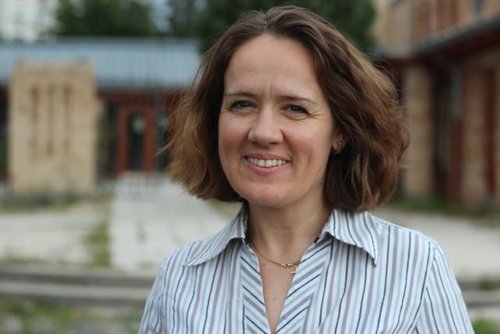
But I couldn’t stop thinking about what it would be like to be Christian, a Reformed pastor, and police officer. I prayed a lot because I didn’t want to serve alone, without God, as a police officer. September of 2017, I joined the police force again. I felt like I didn’t come back alone; I believe and profess that God has a plan for me in my work as a police officer. Even though I work in a secular profession, I’m still a pastor and I serve God’s cause.
You’ve been a police officer again for more than a year. What is it like to be a police officer and a Reformed pastor?
Some of my friends think that being a police officer and a pastor are not compatible. I see it as standing against crime in both professions. It is true, however, that I have to be consciously aware as not to enforce pastoral mission and be a spiritual counselor, and when I serve as a pastor, I have to be consciously aware not to act as a police officer. I find that the two of them together make sense in my life. Previously, during my police work, I didn’t know what to do with the finiteness of life – this played a huge part in me leaving the force. I often encountered death, the depths of human life, family scandals, and lives ruined by drugs. I didn’t know how to deal with such encounters. As a Christian, I now look at these situations from a completely different point of view. I try to observe every action with the eternity in mind. Now I know human life is not just about this – it is much more.
If I understand it correctly, when you first served as a police officer, you weren’t a believer?
Yes, I converted as an adult. Even though I was confirmed at the age of 13, I didn’t really go to church. I turned to God after I became 24. But for this, I had to leave the police force because I couldn’t come to terms with the experiences I was going through during my job. I was plagued by questions: Is this life? What is life really?
Does that mean your police work helped you to arrive to this understanding?
I didn’t even think about it like that, but yes it did. Everything that happens to us, God will use.
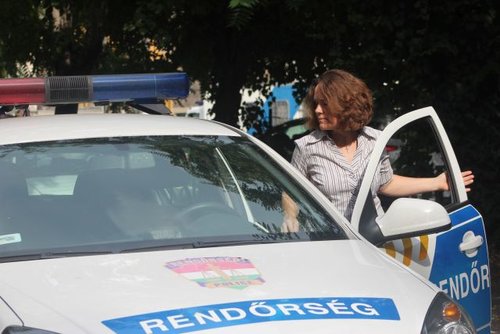
You told Zsaru Magazin that even though you haven’t been a police officer for very long, every time you see a police car your heart starts to beat faster. What draws you so passionately to the police force?
Protecting: We are serving our country and protecting the citizens; that’s what we swore to do. I think every police officer is a hero, and the heroism draws me in. They are also every day heroes; they endure the rightful or unwarranted comments which police officers often get. They are heroes when they face tragedies. They are heroes when they face the depths of human crime. I’ll say it again: every police officer is a hero. We work to solve problems and reveal the truth. In the police profession, I am attracted to being able to help, that I can support people – and it is also present in my career as a pastor.
Are you not afraid?
Everyone is afraid, it’s a natural human emotion and that’s okay. It only becomes dangerous when fear overcomes us. There are situations when I’m afraid, of course. But God is with me, He came here with me, so I’m not alone. He accompanies me to the office, the interrogations, the crime scenes, and is present in my relationships with my co-workers and superiors. God is with me and reaffirms me. It is also with a certain amount of fear that I had to practically relearn the profession. I missed out on 20 years and during that time everything had changed. I had to study because I want to be a good police officer. My faith also helps me a lot with this, because God has a plan and a reason for me to be here.
And do you know what this plan is and the reason why God has led you here?
Yes! It would be great if we could establish a police chaplaincy unit, so that along with psychologists, pastors may also help in the work of the members of the force.
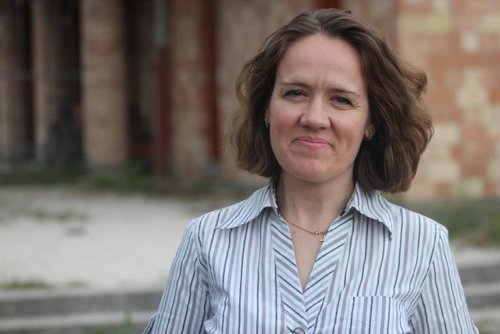
For me, it is quite surprising how many of my fellow police officers do their jobs with a faith in Christ. They go to church, and a lot of them are elders in the church too. Furthermore, for officers who have the openness and willingness, a pastor working in the force may be able to guide them to Christ. This is already an option for soldiers, they have the military chaplaincy. I pray for the opportunity to establish something like that in the police force.
Have you taken steps towards this goal in the church or the force?
This is my dream but it is still very new. I have talked about my idea with my colleagues in the church but there is no official standpoint. I hope that the church will recognize this opportunity. Police officers would greatly benefit from such an option.
Did your colleagues know that when you walked into the office the second time that you also are a pastor?
Yes, but being a pastor means something different here: as a Christian, it shows in my work that I belong to Christ. I feel like they respect that I am a pastor. A huge amount of trust is placed in me so that I could come to work here. I really love my colleagues.
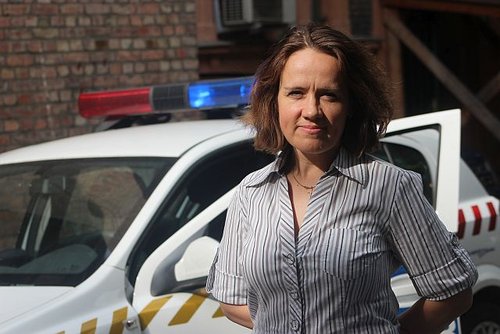
What field do you work in?
I work in children and youth protection, and for me this is the peak of police work. As we say in church circles: schools are the gardens of the congregations, because the growing generations carry on what we teach them. This is why the protection of children and youth are very important to me. I couldn’t dream of a better field.
What do the detectives at the Children and Youth Protection Department deal with?
We work to reveal the truth in serious, violent crimes against youth younger than 18. Searching for witnesses, witness interrogation, confrontation, data gathering, house search, confiscation, deploying experts, suspect interrogation, registering people to criminal records, DNA sampling – in short, I deal with all of these. Here, youth may be victims or perpetrators.
I was afraid you would say that.
I hope that we can turn a youth’s life around. When they commit a crime, they are brought to the police; they are interrogated and must face the consequences relative to the severity of their crime. Of course, it’s obvious with a lot of them that they don’t care, we are already too late. However, there are some who start thinking that this is not the only way to live. I believe that we can be God’s tools in showing the possibility of a better life for young perpetrators.
How much does being a believer and pastor affect your interrogations, questions, answers, and wishes?
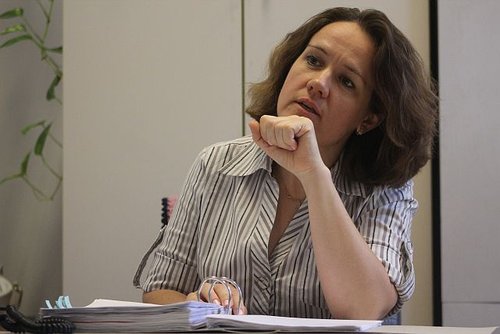
During interrogations, I see people in a different light than I did when I was a police officer twenty years ago. When I sit across from someone who has committed a crime, on one hand, I know that there has to be consequences according to the law because social coexistence has its rules, when we don’t uphold them there will be anarchy. But, on the other hand, I always know that God doesn’t hate the person who committed the crime, but only the crime itself. I try to have this attitude, and I want people to be aware of that: That there is a chance to start over, even after prison. From the aspect of eternity, things don’t end there; they can start again because God forgives. They can ask for forgiveness. I try to regard the person who sits across me with that in mind. Obviously an interrogation is not an evangelization; I’m not the one who needs to talk. However, there were times when after the official interrogation, I talked with the interrogated child or youth about these things.
Do you have a service weapon?
Yes, I do.
As a pastor, it is a rare occurrence to have a weapon. How do you deal with this, how do you handle it?
If it were up to me I wouldn’t carry it, but for the sake of my colleagues, I go out with it – I have to. I have to cover or protect them too. It comes with being in the police force – if we are ordered to.
Do you go to target practice?
Of course! I like to shoot, we have to train ourselves in that too; if there is a situation on the streets, we must be proficient.
Has there been a serious situation where you had to use your gun?
Thank God, no. And I hope there never will be.
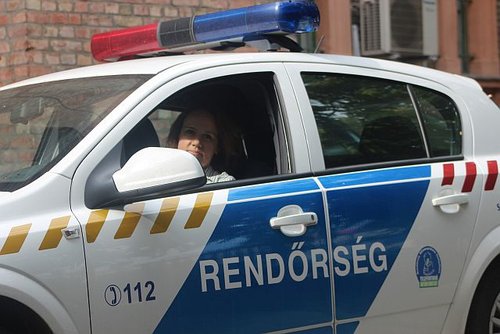
If something weighs on you, do you have anyone to turn to?
In the morning I don’t go to work and at night I don’t go to sleep without sharing my day with God. Without this routine, I would definitely fall apart. Once a month, I visit a spiritual counselor, and I recommend it to my fellow officers as well. Being part of a congregation helps a lot as well.
Which congregation do you belong to? Do you have the opportunity to serve as a pastor as well?
According to ecclesiastical law I am an unassigned pastor, but it has started to bother me because I feel that I am an active pastor. I am thankful for the Budapest-Káposztásmegyer Reformed Congregation and Rev. András Zámbó. The Congregation has accepted me even though I have a secular job. We have an at-home bible study which I lead, and I have preaching duties as well.
If you stand on the pulpit do you tell stories that have happened during your work as an illustration?
Naturally, I tell as much as I can because the police force is part of my life. I also tell stories from my life. There were times when I drew from my experiences in the police as an introductory story.
Have you come across a case that concerned the church?
I haven’t, but my colleagues have told me that they had such cases and that saddens me greatly. It brings to light that the church is also made up of humans. We are fallible people too; it can happen that we fall in a way that’s against the law. For an act against the law a pastor, priest, elder have to account for the same way towards society. For an act against the law, a pastor, a priest, or an elder must take account in the same way as the rest of society.
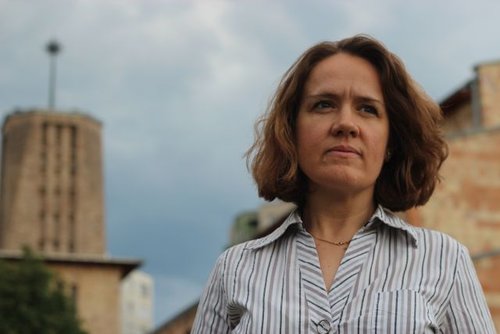
How does your family handle this fluctuation: The police, theology, and then the police again?
When I became a police officer my parents were very proud of me, and were shocked when I left the force. They don’t go to church, so it’s not hard to imagine how afraid they were of my idea to go theological seminary; it seemed crazy to them. By the time they got used to the thought of me being a pastor, I became a police officer again – but they have already accepted that as well.
How do you see your future in, let’s say, five years? Have you been able to make big changes? Is there a possibility for another change in your story, for example becoming the senior pastor of a congregation?
I don’t know. I would like to stay open for God’s will. That is what I’m learning now: to be free and to do what God calls me to do. I don’t want to cement myself in neither of my two jobs. What if eventually God calls me to a third path? Whatever happens then will be good.
Interview by Márk Hegedűs
Translated by Krisztina Schmidt
Photo from Csilla Kapás
Contact us
Click here if you are interested in twinning.
Reformed Church in Hungary
Address: H-1146 Budapest, Abonyi utca 21.
PO Box: 1140 Budapest 70, Pf. 5
Email: oikumene@reformatus.hu
English, German and Korean language services in Budapest
Links
Recommended articles
-
Pastoral Letter in the Light of the Pandemic
Bishop Dr. István Szabó sent a pastoral letter of encouragement to the ministers serving in RCH’s congregations, expressing his gratitude for the persistence and creativity of the pastors.
-
RCH Joins in Pope's Call for Prayer
RCH published the call on congregations to join the initiative of Pope Francis, supported by ecumenical organisations, to unite in praying the Lord’s Prayer on Wednesday, 25 March, at noon.
-
English Speaking Worship Services Online
Each Sunday at 11 AM (CET) the St. Columba's Church of Scotland in Budapest, the international community of RCH invites you to join the worpship service on its facebook page.
-
Test of Humanity and Companionship
Reformatus.hu asked Dr. György Velkey, Director General of the Bethesda Children’s Hospital of RCH about the challenges of health care workers and ways of prevention against the pandemic.
-
All Church Events Suspended
In light of the coronavirus the Presidium of RCH requested congregations to suspend all church events with immediate effect. Beside restrictions, it calls for prayer, sobriety and responsibility.











